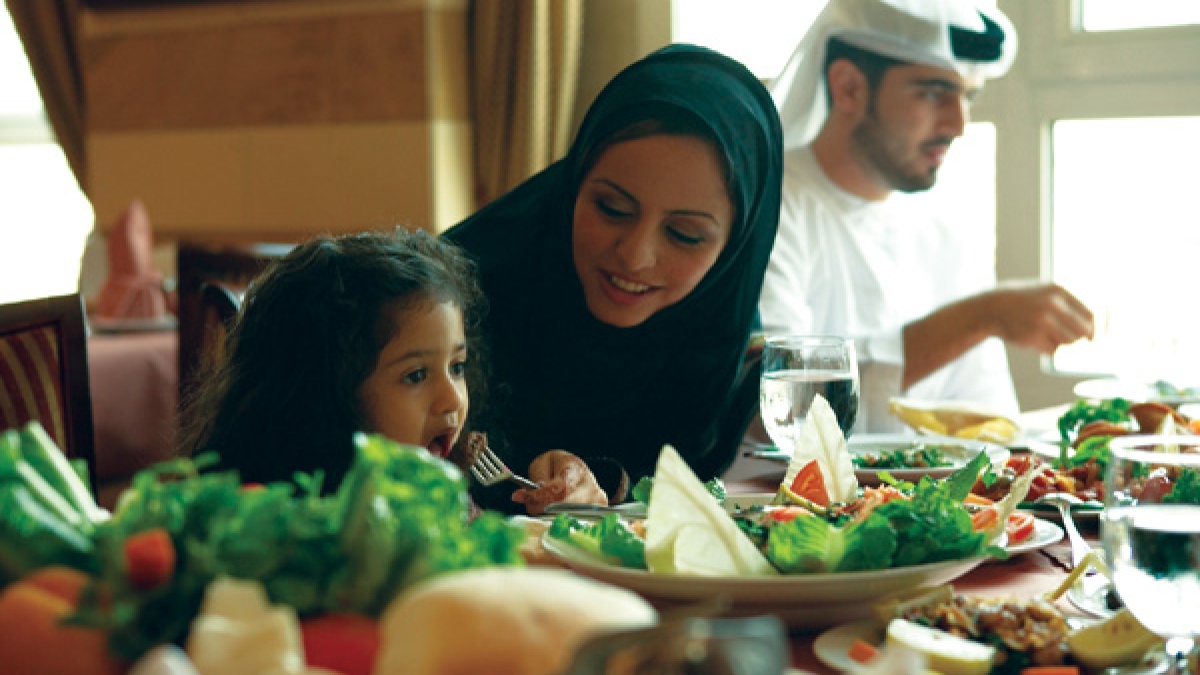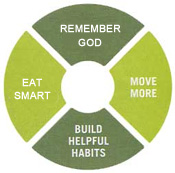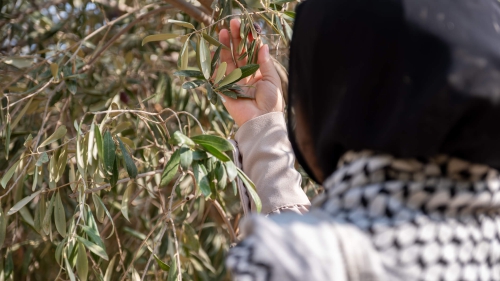Health guidelines for Ramadan

This article provides advice on how to avoid some common problems encountered in Ramadan. If followed, it will enable one to fast comfortably and enjoy fully the spiritual benefits of Ramadan.
 |
During the month of Ramadan, our diet should not differ very much from our normal diet and should be as simple as possible. The diet should be such that we maintain our normal weight, neither losing nor gaining. However, if one is over-weight, Ramadan is an ideal time to normalize one's weight.
In view of the long hours of fasting, we should consume slow digesting foods including fiber containing-foods rather than fast-digesting foods. Slow digesting foods last up to 8 hours, while fast-digesting foods last for only 3 to 4 hours.
- Slow-digesting foods are foods that contain grains and seeds like barley, wheat, oats, millet, semolina, beans, lentils, whole meal flour, unpolished rice, etc. (called complex carbohydrates).
- Fast-burning foods are foods that contain sugar, white flour, etc. (called refined carbohydrates).
- Fiber-containing foods are bran-containing foods, whole wheat, grains and seeds, vegetables like green beans, peas, sem (papry), marrow, corn, spinach, and other herbs like methie (fenugreek seeds), the leaves of beet root (iron-rich), fruit with skin, dried fruit especially dried apricots, figs and prunes, almonds, etc. The foods eaten should be well-balanced, containing foods from each food group, i.e. fruits, vegetables, meat/chicken/fish, bread/cereals and dairy products. Fried foods are unhealthy and should be limited. They cause indigestion, heart-burn, and weight problems.
Avoid
- Fried and fatty foods.
- Foods containing too much sugar.
- Over-eating especially at suhur (the meal before beginning the fast).
- Too much tea at suhur. Tea makes you pass more urine taking with it valuable mineral salts that your body would need during the day.
- Smoking cigarettes. If you cannot give up smoking, cut down gradually starting a few weeks before Ramadan. Smoking is unhealthy and one should stop completely.
Eat
- Complex carbohydrates at suhur so that the food lasts longer making you less hungry.
- Haleem (traditional Indian wheat porridge) or Couscous are an excellent source of protein and is a slow-burning food.
- Dates are excellent source of sugar, fiber, carbohydrates, potassium and magnesium.
- Almonds are rich in protein and fiber with less fat.
- Bananas are a good source of potassium, magnesium and carbohydrates.
Drink
As much water or fruit juices as possible between Iftar (breakfast) and bedtime so that your body may adjust fluid levels in time.
Constipation
Constipation can cause piles (hemorrhoids), fissures (painful cracks in anal canal) and indigestion with a bloated feeling.
Causes: Too much refined foods, too little water and not enough fiber in the diet.
Remedy: Avoid excessive refined foods, increase water intake, use bran in baking, whole wheat flour when making bread.
Indigestion and wind
Causes: Over-eating. Too much fried and fatty foods, spicy foods, and foods that produce wind e.g. eggs, cabbage, lentils, carbonated drinks also produce gas. Remedy: Do not over-eat, drink fruit juices or better still drink water and avoid fried foods.
Lethargy ('low blood pressure')
Excessive sweating, weakness, tiredness, lack of energy, dizziness, especially on getting up from sitting position, pale appearance and feeling faint are symptoms associated with "low blood pressure". This tends to occur towards the afternoon.
Causes: Too little fluid intake, decreased salt intake.
Remedy: Keep cool, increase fluid and salt intake.
Caution: Low blood pressure should be confirmed by taking a blood pressure reading when symptoms are present. Persons with high blood pressure may need their medication adjusted during Ramadan. They should consult their doctor.
Headache
Causes: Caffeine and tobacco-withdrawal, doing too much in one day, lack of sleep, hunger usually occur as the day goes by and worsens at the end of the day. When associated with "low blood pressure", the headache can be quite severe and can also cause nausea before Iftar.
Remedy: Cut down caffeine and tobacco slowly starting a week or two before Ramadan. Herbal and caffeine-free teas may be substituted. Reorganize your schedule during the Ramadan so as to have adequate sleep.
Low blood sugar
Weakness, dizziness, tiredness, poor concentration, perspiring easily, feeling shaky (tremor), unable to perform physical activities, headache, palpitations are symptoms of low blood sugar.
Causes in non-diabetics: Having too much sugar i.e. refined carbohydrates especially at suhur. The body produces too much insulin causing the blood glucose to drop. Remedy: Eat something at suhur and limit sugar-containing foods and drinks.
Caution: Diabetics may need to adjust their medication in Ramadan, consult your doctor.
Muscle cramps
Causes: Inadequate intake of calcium, magnesium and potassium foods.
Remedy: Eat foods rich in the above minerals e.g. vegetables, fruit, dairy products, meat and dates.
Caution: Those on high blood pressure medication and with kidney stone problems should consult their doctor.
Peptic ulcers, heart burn, gastritis and hiatus hernia
Increased acid levels in the empty stomach in Ramadan aggravate the above conditions. It presents as a burning feeling in the stomach area under the ribs and can extend up to the throat. Spicy foods, coffee, and carbonated drinks worsen these conditions. Medications are available to control acid levels in the stomach. People with proven peptic ulcers and hiatus hernia should consult their doctor well before Ramadan.
Kidney stones
Kidney stones may occur in people who have less liquids to drink. Therefore, it is essential to drink extra liquids so as to prevent stone formation.
Joint pains
Causes: During Ramadan, when extra salah (prayers) are performed the pressure on the knee joints increases. In the elderly and those with arthritis this may result in pain, stiffness, swelling and discomfort.
Remedy: Lose weight so that the knees do not have to carry any extra load. Exercise the lower limbs before Ramadan so that they can be prepared for the additional strain. Being physically fit allows greater fulfillment, thus enabling one to be able to perform salah with ease.
Dr. Farouk Haffejee, Islamic Medical Association of South Africa.
Related Suggestions
don't know so the professional will obviously tell us what to do.
Jazakallah Dr Sab. Similarly anything concerning our Deen we should
ask the Ulama not the lay men or browsing on the Computer asking the
Computer making the Websites look like Maulana Ulama and Mashaikh
which is very unfortunate.This simple guideline given by Dr will be
very helpful if we carefully study and practically apply them to our
best ability.

















